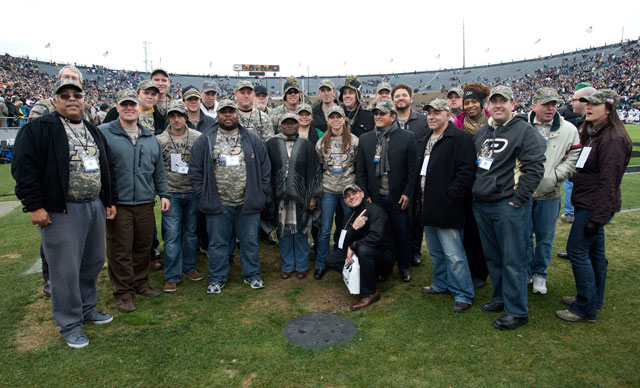Giving to Purdue
University Development Office

Veterans Go From Combat Boots To Business Suits
There is no bond like that made through military service. An unbroken circle held together by the commonality of that service. Some veterans have said this bond is stronger than adversity, stronger than steel, stronger than time. Knowing your life is in the hands of the person next to you in battle, it has to be.
For many, life after the military comes with unwanted change and a strong mix of emotions. Being back in the civilian world can be difficult and frightening. The bonds forged with comrades in extreme hardships cannot be replicated in civilian life and when the veteran arrives home, and works to assimilate back into the world, the largest decision he or she might make in a single day is what job application to fill out next. Life after the military changes dramatically and if there has been a disabling injury, assimilation becomes even more complex.
Lyrics from an Irving Berlin song read, “What can you do with a general when he stops being a general? Oh, what can you do with a general who retires?” Simple enough questions, but in the movie “White Christmas,” the general who retired has lost his sense of belonging, his sense of purpose. He feels unnecessary.
 “While deployed veterans of all ranks take responsibilities for other people’s lives, millions of dollars in equipment and the operations of war that can be enormous in scope,” explains Purdue alumnus Steve Baunach (NRS’97), Army Reserve captain and Director of emergency services at St. Vincent’s Hospital in Carmel, Ind. Baunach, who saw three tours in Afghanistan, adds: “The halt in the kind of adrenalin lifestyle they had been living day-to-day evokes an emotional numbness that can overtake their life, lead to depression, a loss of purpose and feelings of isolation.”
“While deployed veterans of all ranks take responsibilities for other people’s lives, millions of dollars in equipment and the operations of war that can be enormous in scope,” explains Purdue alumnus Steve Baunach (NRS’97), Army Reserve captain and Director of emergency services at St. Vincent’s Hospital in Carmel, Ind. Baunach, who saw three tours in Afghanistan, adds: “The halt in the kind of adrenalin lifestyle they had been living day-to-day evokes an emotional numbness that can overtake their life, lead to depression, a loss of purpose and feelings of isolation.”
During his first year at Syracuse University, J. Michael Haynie, the Barnes Professor of Entrepreneurship in the Whitman School of Management and a former U.S. Air Force officer, wanted to find a way for veterans coming back from the wars in Iraq and Afghanistan with service-connected disabilities, to make the transition from military to civilian life in a way that was freedom-creating and purposeful. As both a veteran and now professor of entrepreneurship, it occurred to him that there is no group of Americans more deserving of the opportunity to live the American Dream of business ownership, than those men and women who went to war to defend that dream. To that end, in 2007 he founded an experiential training venture in entrepreneurship and small business management, the Entrepreneurship Bootcamp for Veterans with Disabilities (EBV).
For post-9/11 veterans with disabilities resulting from service to our country, the EBV comes at no cost to the veterans. Haynie believed they had already paid the price with sacrifices that may have cost them physically, mentally and emotionally. The EBV is now offered at eight schools in a consortium, including Purdue University, who assume all costs associated with the boot camp: travel, lodging, meals and the cost of the program itself.
“Haynie saw the EBV venture as more than an economic avenue for veterans to succeed. He saw it as a way to help repair the veterans psychologically,” explains Elaine Mosakowski, professor of management at Purdue University’s Krannert School of Management and academic director for the EBV program at Purdue. And she adds: “Understanding that veterans face problems with integration back into civilian life, with their families and with their communities; Haynie thought entrepreneurship could be one path to help them do that.”
The EBV is designed around two central elements to help veterans use their strengths and transition their thinking from the field of battle to the fight for market share, profit margins and entrepreneurial excellence. The first is a multi-phased approach that focuses on practical tools and skills of new venture creation and growth. The second is the establishment of a support structure for graduates of the program.
Veterans begin by using several entrepreneurship textbooks to work through some of their business ideas. “Most of their ideas relate in some way to the military or their disability, and are intimately tied to what they are going through,” states Mosakowski. “I am accustomed to my students doing their homework for me. But for EBV students, their homework will be part of what is used to reinvent themselves and their lives. They are creating their futures.”
During a nine-day residency, they learn the nuts-and-bolts of business ownership through workshops, classroom work and lessons from world-class entrepreneurship faculty, and work with mentors who respond to their ideas and meet with them to collaborate on action plans. They also have the opportunity to get technical help and advice at a genius bar.
“On the last day of residency, three panels of judges hear student pitches and awards are presented,” says Mosakowski. Private donations help fund the program at Purdue and provide awards, which are given in three categories: most innovative idea, top commercialization plan and the team spirit award, or as Mosakowski jokingly calls it, the Miss Congeniality prize.
This year the award amounts – or seed money – were $2,000, $1,000 and $1,000 respectively. And Mosakowski adds: “To most people, this award money doesn’t sound like much, but it is a big deal to these students. It may help pay the electric bill or as is the case for one student, pay for a real estate license so he can start his business. It is money to help them along the path to making their business idea a reality.”
In conjunction with Military Appreciation Day at the Purdue vs. Penn State football game, this year’s class appeared on the field during the “I am an American” portion of the pre-game. “They all wore “I am an American: We Support Our Troops” t-shirts,” proudly states Melissa Evens, director of military and veterans affairs at Purdue’s Krannert School of Management. The t-shirts are still available at University Bookstore or Follett’s locations, and Purdue Pride. Hats can be purchased at University Bookstore and University Spirit. A portion of the proceeds from t-shirt and hat sales will support the EBV at Purdue.
Evens, who attended the boot camp at Syracuse, wanted to better understand what the students encounter. “I knew it would be an interesting experience. I listened and learned but what I didn’t know was that feeling in the room and just how special the bond is between these individuals and just how special they are,” she recalls. “It is a gift to Purdue that the EBV program is here.”
Upon commencement, students are provided ongoing technical assistance from faculty experts and EBV partners. “This is when the program really starts for them – when they start putting what they learned into action,” Evens explains.
American entrepreneurs are a breed unto themselves. They resist the day-to-day, clock in/clock out world of predictable outcomes and manufacturing schedules, opting instead for the uncertain world of risk where one only benefits from their own tireless work, decisiveness and ability to lead. This is a world in which they will only succeed if they’re willing to put it all on the line.
Baunach adds: “Without our country’s entrepreneurs, 60 percent of Americans wouldn’t have jobs, new ideas, like iPhones, won’t get invented and a high tech industry wouldn’t exist.” Like soldiers, entrepreneurs know that to be successful one has to lead, follow or get out of the way.
Both soldiers and entrepreneurs are leaders, bred of good followership and once on target, more likely to take action rather than wait for good ideas to be borne by others. Both know how to make decisions, are willing to take calculated risk and know how to make things happen. “What they may lack is the operational planning that’s necessary to make the jump from battlefield to capitalist America and that’s what the EBV can provide,” says Baunach.
Soldiers need entrepreneurial skills and just as important, American entrepreneurism needs soldiers to fuel the business fires that keep our country financially safe and working. The EBV is about building bridges that cross the divide and turn emotional numbness into a business buzz: a buzz that heals, protects and serves the veteran, and by extension, all of us.
The EBV Consortium was formed in 2008 as a national educational initiative, designed to help veterans with disabilities to make the transition to self-employment, develop professional networks and ultimately start and grow sustainable businesses. The EBV Consortium is composed of the Whitman School of Management at Syracuse University, the Anderson School of Management at the University of California, Los Angeles, the College of Business at The Florida State University, the Mays School of Business at Texas A&M University, the Krannert School of Management at Purdue University, the College of Business at the University of Connecticut, the E. J. Ourso College of Business at Louisiana State University and the School of Hotel Administration at Cornell University.
Today, each of these world-class schools offers the EBV program on their campuses, with Syracuse University serving as the national host for the program. The EBV Consortium represents the first major partnership of America's schools and colleges of business since the end of World War II, formed with the express purpose of serving military veterans.

